
THE VOICE OF INTERNATIONAL LITHUANIA
|
VilNews has its own Google archive! Type a word in the above search box to find any article.
You can also follow us on Facebook. We have two different pages. Click to open and join.
|
Author Archive
![]()

Emerging markets have taken noteworthy steps in advancing opportunities for women in the past year, according to the Economist Intelligence Unit (EIU). This is one of the conclusions of the Women’s Economic Opportunity (WEO) Index 2012, which measures specific attributes of the environment for women employees and entrepreneurs in 128 countries.
The findings include:
• Little change over the past year at the top and bottom of the Index. Sweden and Norway, with strong, gender-sensitive legislation and progressive cultural norms, remain at the top, while Chad and Sudan, which have scarce legal, educational and financial resources for women, stayed at the bottom.
• Lithuania and the Slovak Republic tied for the most improved score – an increase of 7.2 points – with gains in multiple areas.
- Bookmark :
- Digg
- del.icio.us
- Stumbleupon
- Redit it
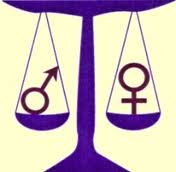
I was glad to see the last issue of VilNews concentrate on 'women's issues' (a phrase which many Lithuanians would think to refer to PMS).
It is good to know something is being done to combat violence against women in Klaipeda, hopefully the other cities, towns and villages will follow its lead.
I lived in Lithuania for over 18 years and the safety issue cropped up multiple times. I am not even talking about generous amounts of everyday sexism - even though my friends and family who live in Lithuania don't see my views on equality as radical, they are sceptical as to the practical implementation of such in the current society. My friends in the UK found it deeply shocking when I revealed that at my schools in Vilnius there was a separation in lessons of Crafts - girls were sent to do sewing and embroidery, whereas boys would do woodwork. It is also still widely believed that if a woman wears a short skirt, she is asking to be sexually abused or harassed.
The whole mindset of the society has to and is bound to change, but for it to happen so the stricter enforcement of laws is necessary and the fight for women's rights should not be limited to small groups working at grassroots level. I also strongly believe that some more social awareness campaigns would not go amiss. There needs to be some real support for women who choose to challenge inequality in educational establishments, workplaces and their everyday surroundings. Maybe then voices challenging sexism and abuse would be heard, rather than ridiculed.
Agne Barysaite,
London
- Bookmark :
- Digg
- del.icio.us
- Stumbleupon
- Redit it
- Posted by - (0) Comment
VilNews focus in March-April
Healing the wounds
between LT-Americans
and the homeland
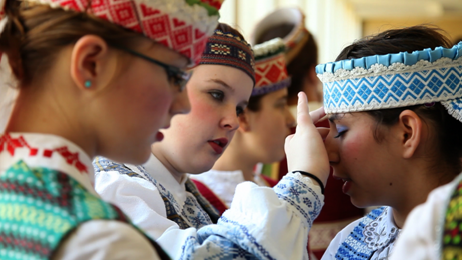
Photo: National Lithuanian American Hall of Fame
Aage Myhre, Editor-in-Chief
aage.myhre@VilNews.com
The relationship between Lithuania’s diaspora groups in the U.S. and the home country Lithuania is not always the best. Many here in Lithuania still believe that those who left, whether for economic or political reasons, had very comfortable lives compared to those who stayed behind and had to fight through several decades of inhuman oppression and abuse by the Soviet occupiers.
Many Lithuanians in the United States believe in turn that the mother country does not welcome them to return or collaborate on improving the development of the nation called Lithuania, and have been critical about ongoing corruption, that rule of law is still not working effectively, etc.
VilNews will through the second half of March and early April focus on this topic, and we hereby invite all with views to prepare posts; in the form of blogs, comment articles or information you think might shed light or be of benefit to the relationship. The goal is to build bridges and contribute to reconciliation!
These are some of the challenges and opportunities we face:
1.
Lithuanian-Americans played a significant role in the post-war years, until Lithuania's recovered independence in 1990-1991, by constantly exerting pressure on the U.S. President and leaders in other Western countries so that they would pressure the Soviet Union to allow the Baltic countries freedom after the Soviet occupation that took place during World War II. Now, as more than 20 years have passed since the freedom bells rang, the question is whether the Lithuanian-Americans have a role to play also today? See our article https://vilnews.com/?p=8899
2.
“The majority, I believe, are disappointed and discouraged with the present president’s seemingly unfriendly view toward Lithuanian-Americans and others abroad.” This said Regina Narusiene, President of the World Lithuanian Community, in a recent interview (see https://vilnews.com/?p=6704), based on a comment referred to in The Baltic Times, where President Grybauskaite should have said that most prominent U.S. Lithuanian émigrés, instead of focusing on developing U.S. - Lithuanian business ties, prefer providing political advice to the Lithuanian authorities, which may not be that necessary nowadays. She was supposedly “disappointed by Lithuanian émigrés’ inability to attract U.S.-based investments to Lithuania.” Here in VilNews we often hear Lithuanian-Americans say they do not feel welcome to their home country, and that Lithuania's current president seems to antagonize them. What are our readers’ comments to this?
3.
In a VilNews interview Regina Narusiene told about her youth in Chicago, after she and her family had settled there after escaping from Lithuania in 1944. One of the things she said, was: “I realized that my father was afraid of informers who could make life difficult for us, for our relatives who remained in Lithuania, and for the Lithuanian partisans who kept on fighting against the Soviet occupants well into the 1950s. The KGB had their own spies within the Lithuanian communities in the U.S., so we were extremely careful with what we said outside the home." Now, when the KGB archives have been made public, are there new traces of KGB post-war activities to be found also in the U.S.?
4.
In a meeting at the Lithuanian Embassy in Washington last year, representatives of LAC (Lithuanian American Council) expressed their concern on a wide range of topics including Lithuania's developing energy policy, the country’s image in the international community, emigration issues and their demographic impact, the prospect of maintaining citizenship rights of recent immigrants, ongoing cooperation between organizations of the Diaspora and Lithuania, and minority issues in Lithuania. LAC representatives suggested that Lithuania would benefit significantly by availing itself of the expertise and knowledge found in the Diaspora communities in developing energy and security policies and a host of other areas such as environmental issues, ecology, medicine, economic development, and the promotion of improved interactions between the government and the people through non-governmental organizations (ref. https://vilnews.com/?p=5031). Has there been any official Lithuanian response to this?
5.
In November 2011, the Jewish Lithuanian Heritage Project hosted a roundtable “Think Tank” at the Lithuanian embassy in Washington. The theme of the discussion was, "A comprehensive Five Year plan to improve Lithuanian-Jewish relations: Cultivating Sunflowers." (ref. https://vilnews.com/?p=9949). In a response, one of our readers wrote: “Is this about the establishment of a new Judenrat to apologize for Lithuanian anti-Semitism? “If truth be told” having a holiday party at Lithuania’s D.C. Embassy is not revolutionary. What would be revolutionary would have been, and would be, is the prosecution of Lithuanian collaborators and SS members, the prosecution of today’s neo-Nazi youth groups, reinstatement of the ban against the display of the swastika and ending the noxious practice of the Uzgavenes holiday when people dress as Jews and beg on the street.” Harsh words?
- Bookmark :
- Digg
- del.icio.us
- Stumbleupon
- Redit it
![]()

Aldona Martin (Martusevicius),
Australia
Am interested to know whether you have historical info/references re Lithuania's history with India, ( with Lithuanian language being based on Sanskrit). Also met a couple from India recently who remarked that my name Aldona is the name of a suburb in the Indian City of GOA... I remember my Lithuanian father relating to me when I was a teenager that Lithuania extended south to India, some centuries ?? ago...perhaps I was not listening / interested at the time...are you able to clarify/provide info ??
Would be most grateful...
From the Editor:
Please write us with any information that could be of help for Aldona. Write to editor@VilNews.com
- Bookmark :
- Digg
- del.icio.us
- Stumbleupon
- Redit it

Also wish to commend you on the outstanding work that you do in bringing us, amazingly interesting articles on such a variety of subjects, together with photographic masterpieces....am now more and more interested in the history of my Fatherland, which I was blessed to visit in 2009 for my first visit and to walk in the footsteps of my ancestors.
My heartfelt thanks to you for your interest and dedication..
Aldona Martin (Martusevicius)
Australia
- Bookmark :
- Digg
- del.icio.us
- Stumbleupon
- Redit it
Putin won, but Russians are growing tired of a political system that entrenches the privileges of an oligarchy of businessmen, bureaucrats and security men
- Posted by - (0) Comment
![]()

Illustration: http://vozni.wordpress.com
The Russian presidential campaign has hardly been short on drama: blood-curdling speeches, outbreaks of protest, the reported thwarting of an assassination plot. In the end, however, the result will be the same as could have been predicted months – or even years – ago. Vladimir Putin will return to the office he left in 2008, with the current president, Dmitri Medvedev, going back to his old job as prime minister.
On the face of it, then, this election means business as usual: Putin and his sidekick back in charge for another six years, and possibly 12.
Yet in fact, it represents something of a watershed for Russia. In the wake of those rigged elections, dissent is growing. Mr Putin has cast himself as the scourge of corruption, the man who tamed the gangsters. Yet Russians are growing tired of a political system that entrenches the privileges of an oligarchy of businessmen, bureaucrats and security men, and of an economy that depends on the fluctuating price of oil and gas rather than the skills and ideas of its workforce.
Mr Putin is still a popular figure, thanks largely to the cult of personality that surrounds him. Yet many of those voting for him yesterday were making a negative choice, rather than a positive one: they support him out of fear of a return to the chaos of the post-Soviet era, and in the absence (thanks to the Kremlin’s own strenuous efforts) of any credible alternative. With opponents of the regime growing increasingly vocal, we suspect he will find his next term in office a great deal more testing than the last.
- Bookmark :
- Digg
- del.icio.us
- Stumbleupon
- Redit it
![]()
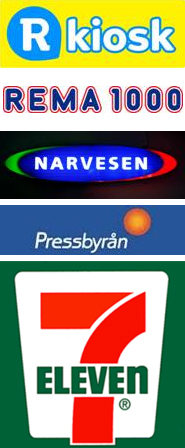
Norwegian Reitan Servicehandel (RSH) has acquired more than 1.000 kiosks from the Finnish media company Sanoma OY in Finland, Estonia and Lithuania. The purchase price is approx. 130 million Euros. As a result of the latest acquisition, Magnus Reitan will manage more than 2.500 stores with close to NOK 14 billion in revenue and 18.000 employees in seven countries.
- This acquisition makes us Europe's second largest convenience store operator, an achievement of which we are very proud. All of the chains have a leading position in their respective markets, and it is with great humility we are going to further develop these brands in Finland, Estonia and Lithuania, Reitan Servicehandel CEO Magnus Reitan says.
The revenue in Finland, Estonia and Lithuania is to a great extent based on traditional newsstand products such as tobacco, magazines and lottery, while Narvesen and Pressbyran to a larger degree have developed new and profitable product groups such as meals to go, drinks and electronic services.
Reitan Servicehandel (RSH) comprises Narvesen in Norway and Latvia, Pressbyran in Sweden, and 7-Eleven in Norway, Sweden and Denmark. RSH holds a leading position in all four countries. As of 31 December 2011 the number of shops was 1.489, and RSH had revenues of NOK 11.4 billion in 2011.
Reitan Servicehandel is a part of the Reitan Group (Reitangruppen). The Reitan Group consists of four areas of operation: REMA 1000, Reitan Servicehandel, Reitan Real Estate (Reitan Eiendom) and the Uno-X Group. In addition, Reitan Group owns the subsidiary Spaceworld and holds a share of 15,62 percent in Axfood. Reitan Group's vision is to become known as Scandinavia's most value driven company. In 2011, Reitan Group had revenue of NOK 63 billion (including franchise turnover) and employed 27.500 people in Scandinavia and Latvia, making it one of Norway's ten largest companies.
- Bookmark :
- Digg
- del.icio.us
- Stumbleupon
- Redit it
- Posted by - (0) Comment
11 March marks the restoration of
Lithuania's independence – how can the
authorities allow neo-Nazis to dominate
this important day for the nation?
 Lithuanians marching for freedom, 10 January 1990. Photo: Vitaly Armand/AFP/Getty Images |
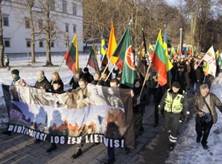 Neo-Nazis marching in Vilnius 11 March 2010. Photo: http://defendinghistory.com |
For the fifth time in the past five years a neo-Nazi parade (this year with a permit enabling a maximum of 2,000 participants) will march through the heart of Vilnius on 11 March, Independence Day, one of the proudest and most significant days for the people of Lithuania. The neo-Nazi theme will be “Homeland.”
Their display, if permitted by the government, will be taken by extremists throughout the region and Europe as a stamp of growing approval of neo-Nazi activities and a signal that the murder of about 95% of Lithuania’s Jewry during the Holocaust, largely by local collaborators, is taken lightly by today’s government.
Help us ban this blemish on a day reserved for the celebration of the internationally acclaimed bravery of the March 11th 1990 declaration of independence that was and continues to be a source of inspiration to all nations seeking freedom from oppression and foreign domination. Allow Lithuania a Day of Dignity.
Help combat racism and anti-Semitism with your signature to the following petition. You’ll find the petition text HERE.
11 March is not a day to
glorify the perpetrators

By Olga Zabludoff
When I learned that the municipality of Vilnius had again issued permits for a neo-Nazi march on Lithuania’s March 11th Independence Day, I was disturbed for more than one reason. Why would the government, which has been purporting its wish for reconciliation with its small Lithuanian Jewish community and Jews everywhere, sanction the resurrection of a Holocaust image? Why would the government, which has been purporting its wish to better its tarnished image with worldwide Jewry, accept and endorse the display of the LAF white armbands imprinted with the flaming swastika? Most survivors of the Lithuanian Holocaust are more traumatized by memories of the white-armbanded Lithuanian Activist Front than by memories of Hitler’s Aryan henchmen. It was the local LAF murderers who began to butcher Jews who had been their neighbors -- this even before their German Nazi masters/commanders came upon the scene. It was the LAF who unleashed the Holocaust in Lithuania. It was then that their slogan was born: “Lithuania for Lithuanians!” (Lietuva Lietuviams).
- Bookmark :
- Digg
- del.icio.us
- Stumbleupon
- Redit it
It is possible to offer some counterweight
- Posted by - (0) Comment

By: Myra Sklarew
When I stood in Rotuses Square in Kaunas last September, I listened to a young man speak about the burden he had carried in his young life to know that his own grandfather had been one of the killers during the War, a member of the Lithuanian Activist Front and part of a mobile killing unit. The young man asked forgiveness.
And when I stood with a group of some fifty people next to the place of massacre of over 2000 Jewish people in Kedainiai—a place where twenty-nine of my own family members were murdered, I saw how Lithuanians were making the enormous passage across time and cultural divide to embrace a wrong that they had nothing to do with. I ask myself if I have done enough in my own country to right the wrongs committed by my forebears.
- Bookmark :
- Digg
- del.icio.us
- Stumbleupon
- Redit it
Lithuania rescues 200 fisherman on ice floe
- Posted by - (0) Comment
![]()

Emergency crews in Lithuania rescued around 200 fishermen stranded on an ice floe in the Curonian Lagoon at Lithuania’s West Coast.
Two border patrol boats and a military helicopter were used in the operation Friday, and rescue coordinator Antanas Brencius said no one was injured.
Brencius says a crack in the ice in the Curonian Lagoon was widened by the northern winds, to the extent that the fishermen could not cross it and return to shore.
The freshwater lagoon is a popular fishing and holiday resort on the Baltic Sea.
- Bookmark :
- Digg
- del.icio.us
- Stumbleupon
- Redit it
Two workers die at Mažeikių Nafta
- Posted by - (0) Comment
![]()

Two workers have died at the Mazeikiu Nafta oil refinery in Lithuania after a vacuum tank exploded.
Refinery spokesman Andrius Stasiulaitis says the blast had a limited scope and has not affected overall operations at the plant, which is owned by Poland's PKN Orlen and is the largest enterprise in Lithuania in terms of revenues and taxes paid.
Stasiulaitis said Friday that the explosion killed two workers ages 48 and 51, and that an investigation has been launched.
A major fire broke at the refinery in 2007, causing some €38 million in damages and a significant decline in output.
- Bookmark :
- Digg
- del.icio.us
- Stumbleupon
- Redit it
Some fresh pictures from Kaziuko Muge 2012
- Posted by - (0) Comment
- Bookmark :
- Digg
- del.icio.us
- Stumbleupon
- Redit it
Warsaw is this week ‘decorated’ with photos of Norwegian neo-Nazi mass murderer
- Posted by - (0) Comment
![]() Some Eastern Europe countries have seemingly not realized how dangerous it can be to provide neo-Nazis room for their 'presentations'.
Some Eastern Europe countries have seemingly not realized how dangerous it can be to provide neo-Nazis room for their 'presentations'.
We Norwegians had to bitterly experience how dangerous such mindsets can be, last summer when the neo-Nazi Anders Behring Breivik cold-bloodedly murdered 77 innocent people. We will earnestly suggest that the rest of Europe try to learn from what happened in Norway 22 July 2011, not allowing neo-Nazi marches, posters or other kinds of space for spreading the dangerous messages and history falsifications these people represent. Norway had to learn it the hard way...

Portrait of the Norwegian neo-Nazi mass murderer Anders Behring Breivik all over Warsaw these days.
Photo: www.vg.no
Throughout the Polish capital's bus stops are these days covered with meter-high portraits of Anders Behring Breivik, the Norwegian neo-Nazi who brutally murdered 77 persons last summer.
The posters are made of one of the pictures Breivik used for the so-called manifesto he sent out after the terrorist attacks on 22 last July.
The portrait is in black and white and pixel led, but you can clearly see who the posters are representing.
According AP, a lot of of Norwegians who have been on holiday in the Polish capital, reacted to the massive posters with disbelief.
Read the article
(in Norwegian)...
- Bookmark :
- Digg
- del.icio.us
- Stumbleupon
- Redit it
How do Baltic presidents get airborne?
- Posted by - (0) Comment

The life of the president of any country is impossible without international visits, which are simply impossible to implement without the achievements of modern civilization - the planes and helicopters. In this regard, Belarusian “Telegraf” journalists have decided to find out, what aircraft high-ranking officials of Belarus and its neighboring states travel by.
- Bookmark :
- Digg
- del.icio.us
- Stumbleupon
- Redit it
Grybauskaite flies economy class!
- Posted by - (0) Comment
![]()
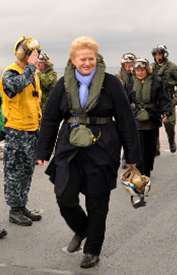
President Grybauskaite aboard the amphibious command ship USS Mount Whitney.
U.S. Navy photo by Mass Communication Specialist 2nd Class Sylvia Nealy/Released
President of Dalia Grybauskaite flies by regular air-liners. In Europe, she enjoys the economy-class, outside the continent – business-class.
However, it is exactly economy class that Grybauskaite has used for her first overseas visits to Sweden and Latvia. At the same time, her flight from Vilnius to Stockholm cost $330.
The reason for this is that the Cabinet has considered a private jet too big a luxury for the country.
For flights Grybauskaite employs cruise aircraft airlines Aeroservisas. If the President landed in a country only in order to transfer to the other aircraft at the airport it is usually only meets Lithuania's Ambassador to this country.
In turn, the airline offers a small airplane of business-class "Cessna 560 Citation V," designed for seven to eight passengers among the country's highest officials. At the same time Aeroservisas director Ben Laurinaytis reported that the plane hadn’t been bought specifically for presidential use. "This is a new product, offered by Aeroservisas to its customers," he said in 2009.
- Bookmark :
- Digg
- del.icio.us
- Stumbleupon
- Redit it
- Posted by - (4) Comment
11 March marks the restoration of
Lithuania's independence – how can the
authorities allow neo-Nazis to dominate
this important day for the nation?
 Lithuanians marching for freedom, 10 January 1990. Photo: Vitaly Armand/AFP/Getty Images |
 Neo-Nazis marching in Vilnius 11 March 2010. Photo: http://defendinghistory.com |
For the fifth time in the past five years a neo-Nazi parade (this year with a permit enabling a maximum of 2,000 participants) will march through the heart of Vilnius on 11 March, Independence Day, one of the proudest and most significant days for the people of Lithuania. The neo-Nazi theme will be “Homeland.”
Their display, if permitted by the government, will be taken by extremists throughout the region and Europe as a stamp of growing approval of neo-Nazi activities and a signal that the murder of about 95% of Lithuania’s Jewry during the Holocaust, largely by local collaborators, is taken lightly by today’s government.
Help us ban this blemish on a day reserved for the celebration of the internationally acclaimed bravery of the March 11th 1990 declaration of independence that was and continues to be a source of inspiration to all nations seeking freedom from oppression and foreign domination. Allow Lithuania a Day of Dignity.
Help combat racism and anti-Semitism with your signature to the following petition. You’ll find the petition text HERE.
11 March is not a day to
glorify the perpetrators

By Olga Zabludoff
When I learned that the municipality of Vilnius had again issued permits for a neo-Nazi march on Lithuania’s March 11th Independence Day, I was disturbed for more than one reason. Why would the government, which has been purporting its wish for reconciliation with its small Lithuanian Jewish community and Jews everywhere, sanction the resurrection of a Holocaust image? Why would the government, which has been purporting its wish to better its tarnished image with worldwide Jewry, accept and endorse the display of the LAF white armbands imprinted with the flaming swastika? Most survivors of the Lithuanian Holocaust are more traumatized by memories of the white-armbanded Lithuanian Activist Front than by memories of Hitler’s Aryan henchmen. It was the local LAF murderers who began to butcher Jews who had been their neighbors -- this even before their German Nazi masters/commanders came upon the scene. It was the LAF who unleashed the Holocaust in Lithuania. It was then that their slogan was born: “Lithuania for Lithuanians!” (Lietuva Lietuviams).
I am well aware of the constitutional right of free speech granted to all citizens in democratic countries. That is not even the issue here. All groups, no matter how repugnant their agendas, have the right to march and to chant. However, the government has the right to regulate when and where they march and chant. Independence Day in Lithuania is a special day on the calendar – a day to commemorate its freedom after nearly 50 years of Soviet repression. It is not a day to glorify the perpetrators and their nightmarish actions that led to the extermination of 95% of Lithuanian Jews and the large proportion of the country’s other ethnic minorities during WW2. It is not a day to honor the Nazi collaborators armed with their nauseating symbols and sickening chants. Is this under the guise of “patriotism” or a flawed, sinister concept of patriotism?
The government should not so appease neo-Nazis as to allow them to take over the heart of Vilnius on the sacred Independence Day, March 11. Under the permit issued by the government, up to 2,000 neo-Nazis are permitted to parade along Gedimino Prospect during prime time. Sure, they should be allowed to demonstrate, but on another day and at another location. Why is it that the human rights activists who plan to counter-march in Vilnius have been relegated to a much later hour -- long after the neo-Nazi procession has left its footprints on Vilnius’s major boulevard? Why is there no accommodation for the human rights community to look the neo-Nazis in the face and peacefully and legally confront them?
The governments in various cities in Germany have taken actions regarding neo-Nazi marches: they do not permit these parades along major boulevards. Some 40 years ago in Skokie, Illinois, USA (a community with a large number of Holocaust survivors), a group of fascists applied for a permit to march. After years of legal battles, permission for the march was rejected in Skokie. Instead, the group was permitted to march in a secluded area outside of Chicago. In my country there are neo-Nazis too as well as white supremacist groups and other organizations that promote hatred, intolerance and bigotry. But you don’t see them marching down Pennsylvania Avenue in Washington, DC, on July 4 – our Independence Day.
Appalled by the government’s tacit approval of annual Independence Day neo-Nazi marches since 2008, I launched, in partnership with DefendingHistory.com, a petition to the Lithuanian Ambassador to the United States urging him to persuade his government to ban the 2012 Vilnius march. On the internet some opponents have asked why a foreigner would dare to interfere in their country’s policies and politics. The answer is very simple for me: Exactly 70 years ago the world remained silent while millions of human beings were gassed in death factories and exterminated in killing fields. We all live on the same planet. We are governed by human rights which have no boundaries.
Let me tell you what I have learned from the petition. If the theme of a petition strikes a universal chord, it travels far and wide, finding its way into remote places on the planet. It takes on a life of its own and connects strangers to one another through a common cause. In the first ten days of its life, the petition drew more than a thousand signatures from 42 countries on every continent. Many were accompanied by poignant statements (reasons for signing the petition). In some cases a single email or post, either from me or from a second party, can generate 50 signatures, and those 50 signatures can multiply into hundreds more.
“This is MY country and if I sign your petition,
I will have problems, you understand?”
I stumbled onto a few Lithuanian Facebook websites and posted on their walls. First came a flurry of “Likes.” I had ventured into a network of Lithuanian youth. Then one of them asked: “This is MY country and if I sign your petition, I will have problems, you understand?” I responded that if he believed he would have problems, he should not sign. Within ten minutes his signature came in, followed in rapid succession by half a dozen others from the same town. In unity they felt empowered to speak their collective mind.
This kind of banding together for strength should send a signal to the government in Vilnius that their decent citizens want no part of resurrecting and glorifying neo-fascists. These young men and women are the true patriots who realize that their government’s sponsorship of neo-Nazism will ultimately bring their country down.
Here are some comments from Lithuanians who have signed the petition:
“I am signing because I love my country.”
“Our homeland is for all who want to live there.”
“Even in a tolerant society racial hatred cannot be tolerated.”
“I am ashamed that my nephews are growing up in Lithuania believing that such hate speech is considered ‘normal’ by the government. More should be done to support marches that are organized by tolerant Lithuanians.”
“This march is not just about racism and anti-Semitism. It’s also about homophobia, sexism, xenophobia, and an overall culture of violence, close-mindedness and hatred.”
“I have found the Lithuanian government’s failure to acknowledge and accept the Lithuanian people’s part in the only Holocaust to have taken place in Lithuania, the murder of innocent Jews during 1941 to 1944, a disgrace and a shame for all the decent folk of the country.”
“I don’t like hate and I doubly hate this because I’m ethnically Lithuanian.”
“The parade in Vilnius on Lithuanian Independence Day is a tragic continuation of centuries of anti-Semitism that has brought shame to much of Europe.”
“It is a pity that people don’t understand that Nazism will bring mankind to a catastrophe.”
“It is shameful that neo-Nazis march through the heart of Vilnius on March 11, Independence Day.”
“Live in peace and love.”
Every time a new signature is registered, the Lithuanian Ambassador to the US receives an email with the signed petition letter and comment (if one is made). Isn’t it time, Mr. Ambassador, to tell your government that the people of Lithuania do not support neo-Nazi parades? Instead of condoning these marches, Lithuanian leaders should be speaking out publicly against them -- and certainly against these marches being held in the city center of the capital on Independence Day. Instead of appeasing the ultra-nationalist factions in the country, who have a strong political voice for their numbers, leaders should lend an ear to their worthy citizens who crave tolerance and harmony. Their numbers are greater than you may wish to acknowledge. Lithuanian leaders must realize that to be a viable part of the democratic world, they must take a vigorous stance against those groups who would honour the memory of the LAF and its heinous crimes against humanity. The LAF’s legacy is Lithuania’s shame. Those courageous Lithuanians who rescued Jewish neighbors from the LAF should be Lithuania’s pride.
_______________________________________________________________________
Here is a percentage breakdown by country of the first 1,100 signatures to the petition:
United States 37.6
Lithuania 22.5 *
Israel 7.0
Latvia 5.6
United Kingdom 4.9
Canada 3.1
Russian Federation 2.8
Germany 2.5
South Africa 1.7
Australia 1.6
Estonia 1.4
Poland 1.3
Brazil 1.2
France 1.2
28 other countries 5.6
_____
100.0 %
The 28 other countries represented in the petition include: Albania, Armenia, Austria, Belarus, Belgium, Bulgaria, Burkina Faso, Czech Republic, Denmark, Dominican Republic, Finland, Greenland, Hungary, India, Ireland, Italy, Korea Republic of, Lebanon, Mexico, Moldova Republic of, Nambia, Netherlands, Norway, Portugal, Spain, Sweden, Ukraine, Uruguay.
*Includes at least 31 Lithuanians living in other countries.
_______________________________________________________________________
The petition is here:
http://www.change.org/petitions/lithuanian-ambassador-to-the-united-states-ban-neo-nazis-from-desecrating-the-dignity-of-lithuanias-independence-day
For a report on the recent neo-Nazi march which took place in Kaunas on February 16, see:
http://defendinghistory.com/300-neo-nazis-march-through-the-center-of-kaunas-on-lithuanian-independence-day-they-are-addressed-by-members-of-parliament/31188
and
http://defendinghistory.com/wp-content/uploads/2012/02/Nerijus-Povilaitis-interview-of-Dovid-Katz-on-16-Feb-2012-Lietuvos-rytas.pdf
For a parallel petition against the Waffen SS march in Riga, Latvia, please see:
http://stop16marchinriga.blogspot.com/
- Bookmark :
- Digg
- del.icio.us
- Stumbleupon
- Redit it
VilNews e-magazine is published in Vilnius, Lithuania. Editor-in-Chief: Mr. Aage Myhre. Inquires to the editors: editor@VilNews.com.
Code of Ethics: See Section 2 – about VilNews. VilNews is not responsible for content on external links/web pages.
HOW TO ADVERTISE IN VILNEWS.
All content is copyrighted © 2011. UAB ‘VilNews’.

 Click on the buttons to open and read each of VilNews' 18 sub-sections
Click on the buttons to open and read each of VilNews' 18 sub-sections 















.jpg)



